The beasts were dying of thirst. They dug a well, but Master Rabbit refused to dig, saying “I have enough juicy food.”
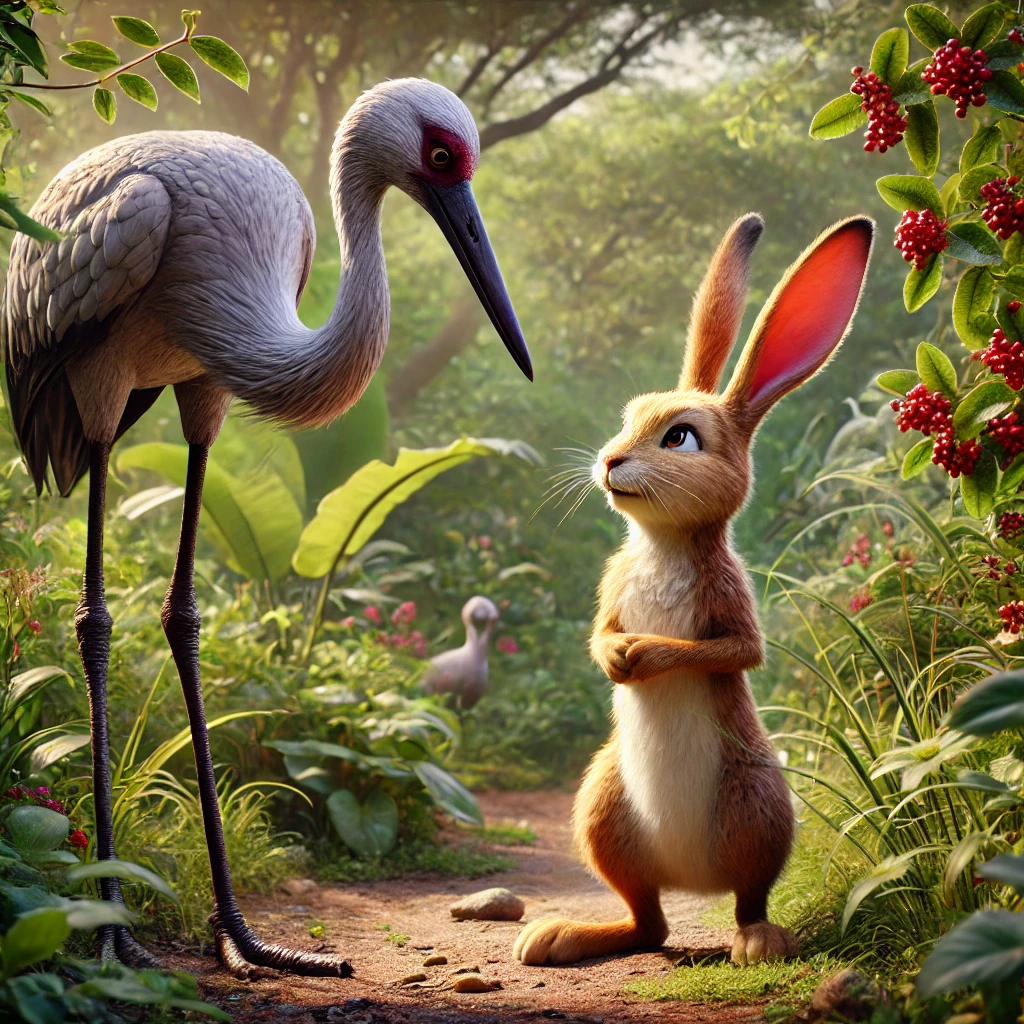
He went and met the crane. They resolved to gather certain berries called mfulimuninga or nkoroondo, and soon they found them. Then they ate some and put the others aside. This done, they went and walked each his own way in the forest.
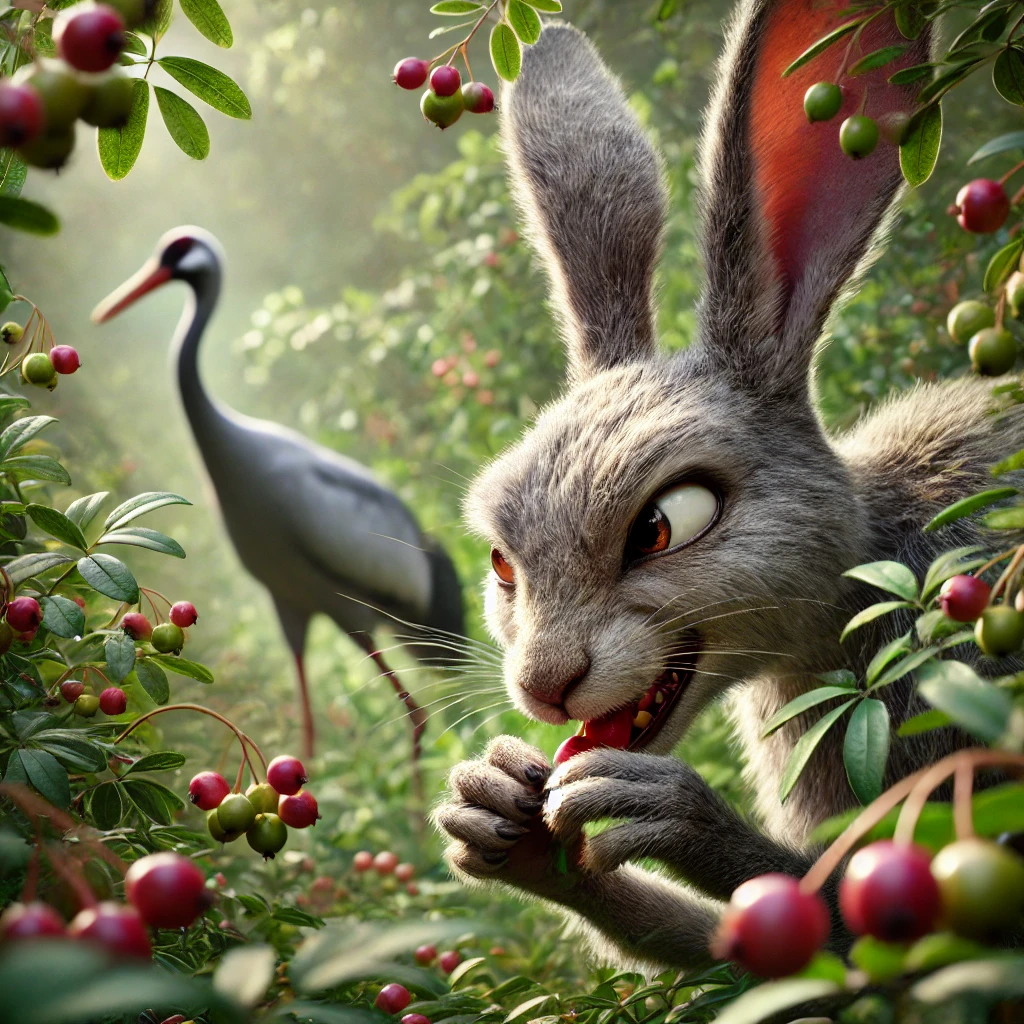
While they were on their walk, Master Rabbit bethought himself of going back, and he went and ate all the berries.
He then called to the crane and asked, “Who has eaten my berries? It must be you, Crane, since you were here.”
“Friend,” said the crane, “I have not seen them.”
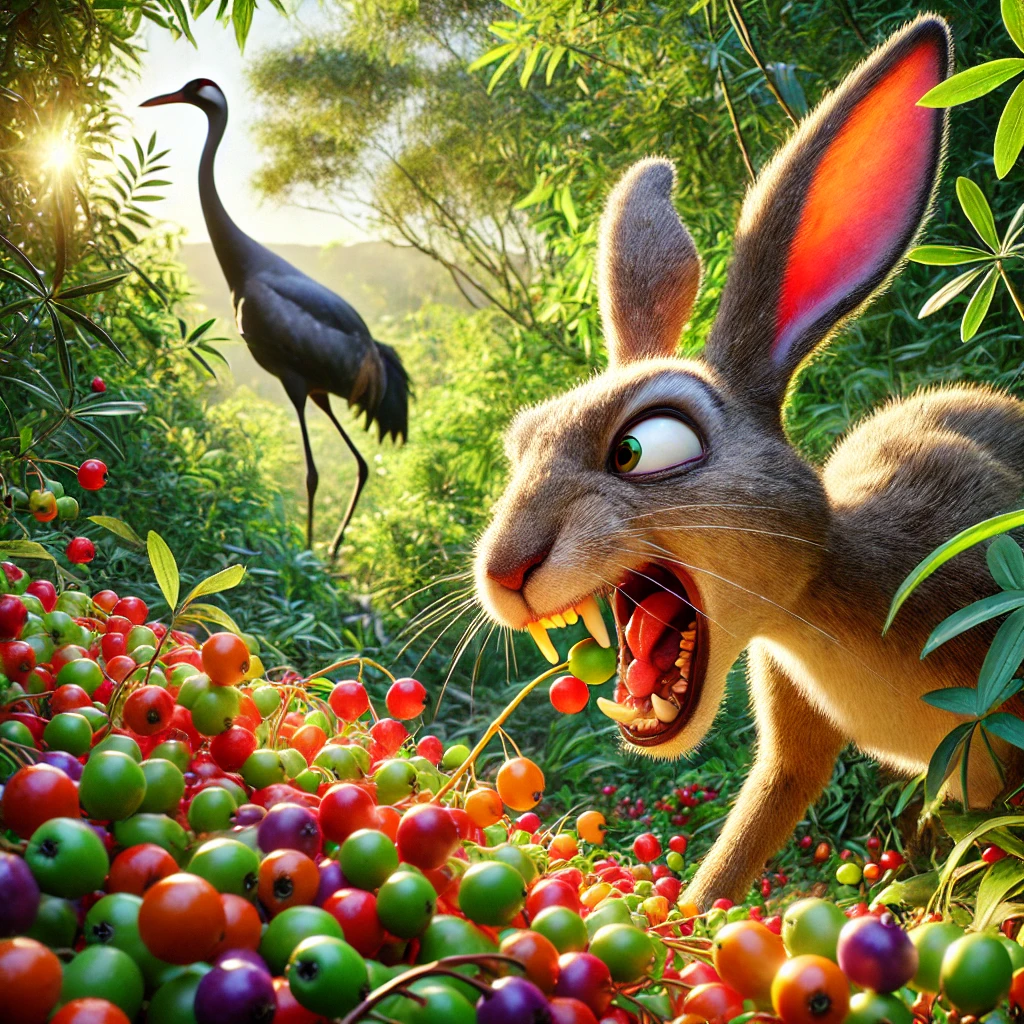
“Now,” said the rabbit, “what will you pay me for the berries, my berries which you have eaten?” and he went on singing:
“My berries!
I am dead, I am eaten up.”
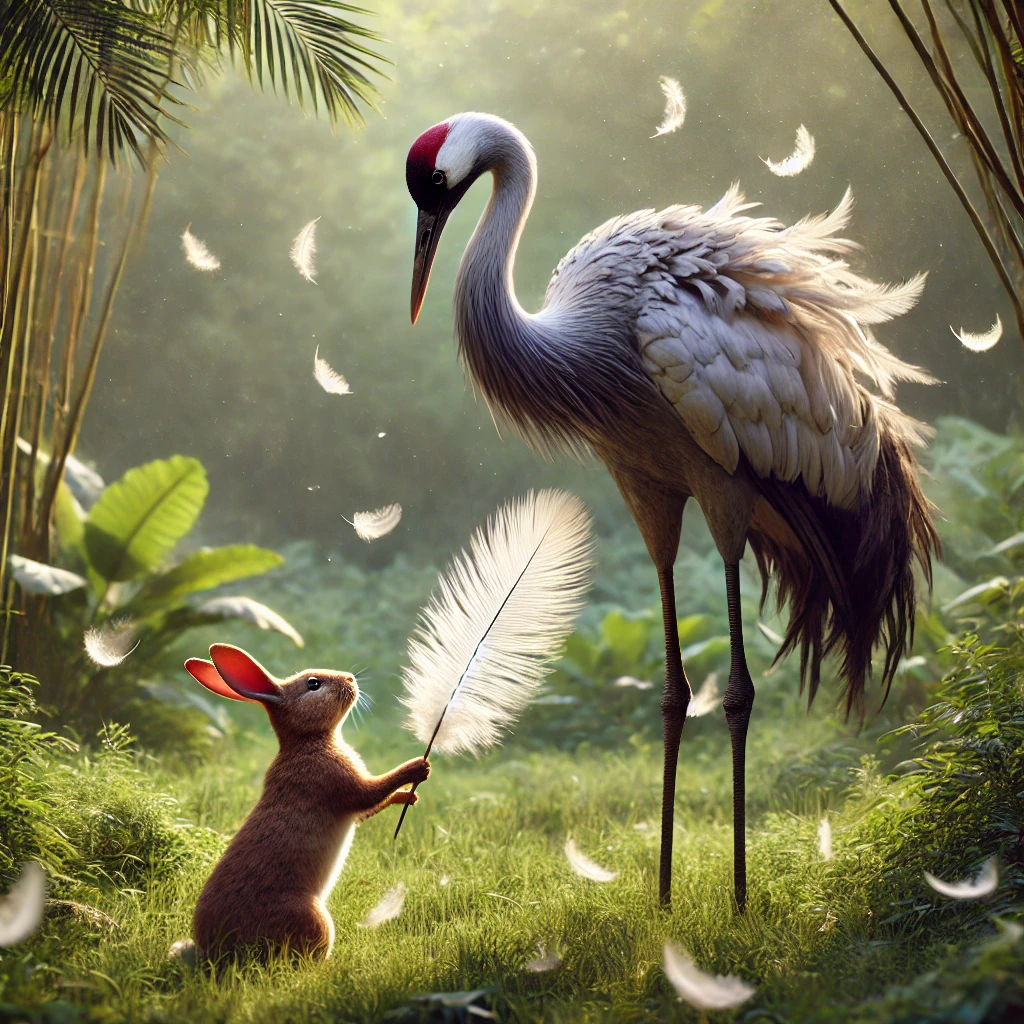
Mother! There is the crane shaking off and shaking off some of his feathers… “Which is the biggest?” he said, He threw a big one to Master Rabbit, who picked it up and went on his way home.

There he goes… He happened to meet on the road some people who were dancing the war dance and throwing the assegai at one another. “Here is a feather,” he said, “for one of you to put on.” So one of them stuck the feather on his head, but a gust of wind came and blew it off….
“Hello, munsanje!” said the man. “There is your feather going away.”
“Let it go,” said the rabbit, “let it go. What is it worth?”
“Well, Rabbit,” asked some of the people, “Does it not look as if we were men?”
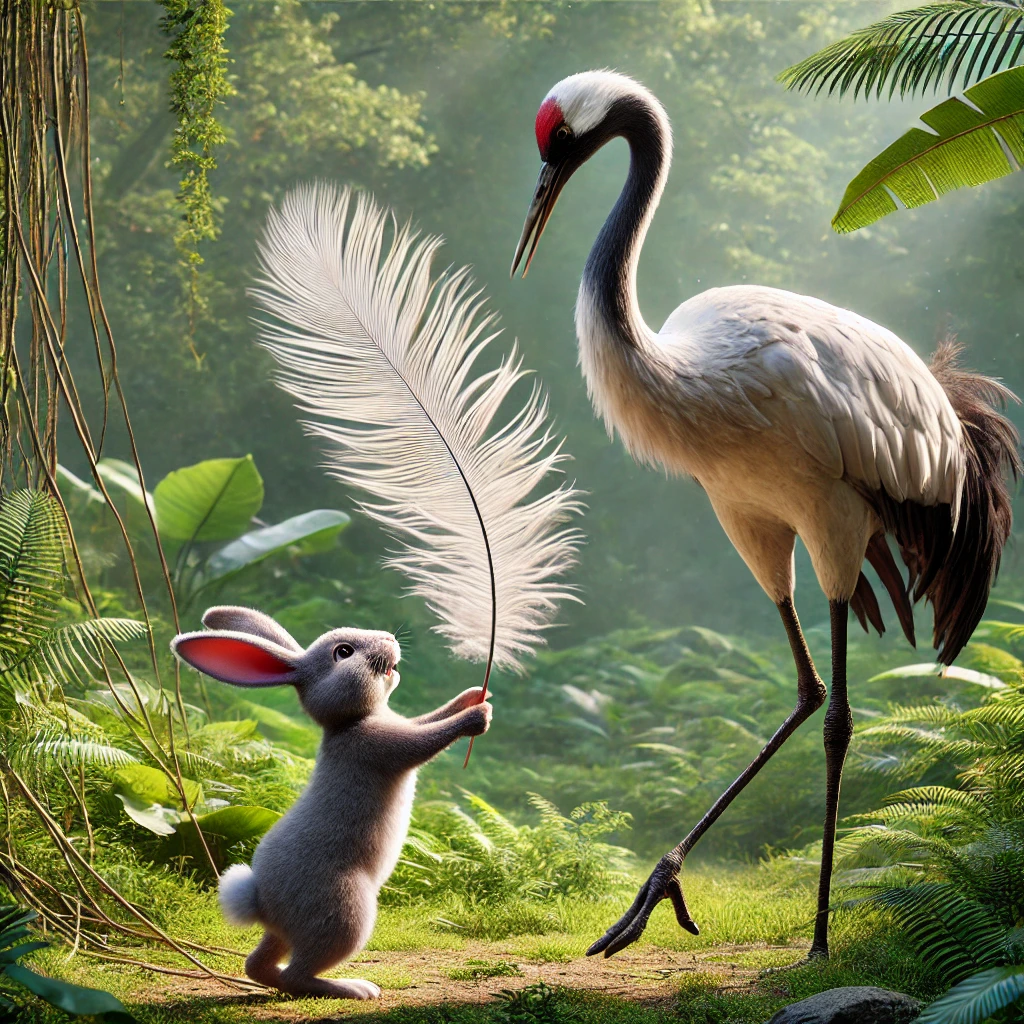
The sun was going down, Someone said, “Have they given you back your feather?”
“They have not.”
So he sang:
“alas! My big feather,
That i got from my brother the crane,
The crane that ate my berries,
My berries that I found on a dry tree.
My berries! I am dead, I am eaten up.”
They gave the rabbit a fish-spear. He picked it up and went and met some people who were fishing. “here is a spear,” he said, “for one of you to spear the fishes.”
One man took it and went on killing fish after fish until he hit a big one. There was the spear disappearing into the water. Dear! Dear! It was going to stop only at the bottom.
“O munsanje, your spear is gone.”
“Let it go. What is it worth?”
When the rabbit saw the sun go down, he said, “It looks as if the sun were going while we rabbits are still here.”
“Yes,” he sang,
“My spear that I got from playing at war,
The people playing at war that lost my big feather,
The big feather that I got from my brother the crane,
The crane that ate my berries,
My berries that I found on a dry tree.
My berries! I am dead, I am eaten up.”
They made for the rabbit a parcel of fish, and he picked it up.
He went on and met some people who were eating porridge without relish. He asked them, “Do you really eat without relish? Here is some fish.”
They put the pot on the fire, then ate, and finished the fish while Rabbit slept. He then awoke. “Have you finished them?” he asked.
“Alas! My fishes which you have eaten,
The fishes that I got from people
fishing with kafir-corn stalks,
The fishermen that lost my fish-spears,
The fish-spear that I got from people playing at war,
The people playing at war that lost my big feather,
The big feather that I got from my brother the crane,
The crane that ate my berries,
The berries that I found on a dry tree.
My berries! I am dead, I am eaten up.”
They gave him kafir corn. He took it and went and met some people who were eating sour milk. “Here is some grain,” he said. “Grind it and cook some light porridge.”
They cooked it and ate it all up… Then he remembered: “Have they given you back your kafir corn, Rabbit?”
The sun was going down. So he said, “Give me back my kafir corn.”
“What?” they replied. “Did you not give it to us?”
“And I, did I tell you to eat it? O mother!
“Alas! my kafir corn that you have eaten,
The kafir corn that I got from people
Who were eating porridge without relish,
The people eating without relish that ate my fishes,
The fishes that I got from people
fishing with kafir-corn stalks,
The fishermen that lost my fish-spears,
The fishermen that lost my fish-spears,
The fish-spear that I got from people playing at war,
The people playing at war that lost my big feather,
The big feather that I got from my brother the crane,
The crane that at my berries,
My berries that I found on a dry tree.
My berries! I am dead, I eaten up.”
They gave him sour milk. So he went on and on, walking carefully. He then saw clouds: “Now,” he said, “it looks as if this little cloud were going to drench me. Somebody will have to pay for it.”
So he went to the top of an ant-hill. And there the little cloud burst upon him. He began to slip and fell over there. There was the sour milk spilt on the ground… “To think, he said, “that my sour milk should be spilt like that!
“My sour milk that I got from people eating think milk,
The people eating thick milk, that ate my kafir corn!
Ant-hill!
Give me my sour milk.
Ant-hill!
Give me my sour milk.”
O mother! Did not the ant-hill actually send out winged ants form him!
He picked them up and went to meet the lion, who was guarding the animals’ well. “Give me some water, ” he said, “I am thirsty.”
“This is no water for the rabbit,” said the lion. Did you not refuse to dig?
The rabbit said, “Do you know what I have here?”
“What is it that you have?” asked the lion.
“They are winged ants,” answered the rabbit.
“Well!” said the lion. “Tie me up while I eat, but let me have the winged ants.”
The rabbit tied him up properly, then gave him the winged ants. After that he went and drank his fill, and, when he had had enough, he took a bath in the well. Then he said, “Your water is all dirtied, as we are rabbits.” He went away.
Soon after that the beats came to drink from their well. They found the water dirty and asked, “Who is it that has made our water so dirty?”
The lion said, “It is the rabbit. Do you not see how he has tied me up?”
“What! The little rabbit has tied up such a big person! How did that happen?”
“He deceived me by giving me winged ants.”
The beats, hearing that, got up and, coming up to the rabbit, fired a cannon at him, boom! and he came to an end.
So does my little story.
[ THONGA ]
